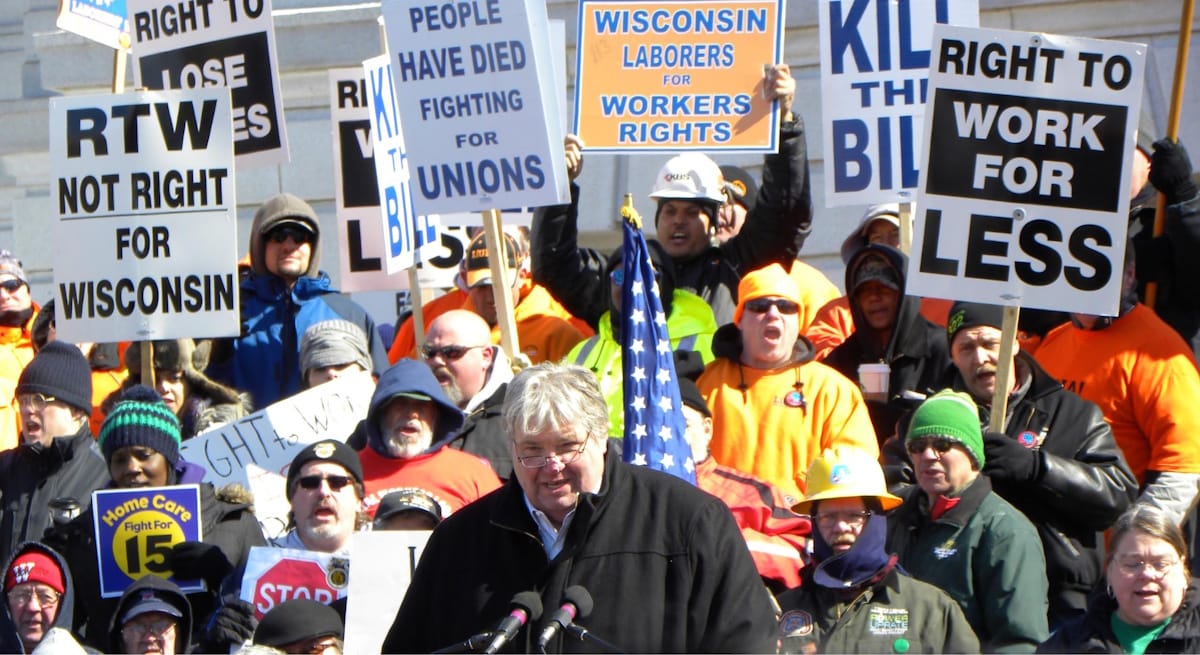Laborfest honors workers, unions and the state's history in the country's labor movement
Wisconsin passed the first apprenticeship law in the United States in 1911, providing protections for both workers and employers. Wisconsin’s apprenticeship system later became a model for other states and for the federal government.

Wisconsin is often referred to as the Birthplace of the Labor Movement.
The state’s first unions were formed in Milwaukee. The Bricklayers' Union was founded in 1847, and the Carpenters' Union in 1848. Along with Congressmen Victor Berger and Robert La Follette, Wisconsin led the way in reforms that included the eight-hour workday, unemployment compensation, and the right for workers to organize and form unions.
To honor all that history and to recognize and to acknowledge unions and workers around the state, the 42nd Annual LaborFest, sponsored by the Fox Valley Area Labor Council, will be celebrated on Labor Day Sept. 1. It all kicks off with a parade beginning at 10 a.m. in Menasha at Curtis Reed Square and will proceed to downtown Neenah.
Festivities continue throughout the day until 5 p.m. at the Neenah Labor Temple, located at 157 S. Green Bay Road in Neenah, where there will be food, drink, games and live music.
“Local Labor Councils in Wisconsin will be hosting Labor Day celebrations around the state to celebrate together in solidarity,” said Stephanie Bloomingdale, President of Wisconsin AFL-CIO. “All are welcome to join for a fun-filled, union-made day of picnics, parades, celebrations, and more.
“We are celebrating the power of working people as we organize to build a better future for ourselves and our families.”
Twelve Laborfest celebrations are scheduled to take place throughout Wisconsin on Labor Day.





Wisconsin's first Labor Day celebration took place in 1893, when it was designated as an official state holiday. By 1894, twenty-three more states had adopted the holiday, and President Grover Cleveland signed a law making the first Monday in September a national holiday.
Wisconsin passed the first apprenticeship law in the United States in 1911, providing protections for both workers and employers. Wisconsin’s apprenticeship system later became a model for other states and for the federal government. As of January, Wisconsin ranked 11th nationally in the number of active apprentices per 1,000 residents, according to a report recently published by the Wisconsin Policy Forum.
Labor under assault from state, national policies
The union movement sought to empower workers to collectively bargain for better wages, benefits, and working conditions. Union advocates today argue that unions play a crucial role in protecting workers' rights, ensuring fair treatment, and promoting a safer work environment and in helping to level the playing field between employees and employers.
Three Wisconsin policies over the past 15 years have significantly impacted unions and reduced their political power.
The 2011 Wisconsin Act 10 significantly curtailed collective bargaining rights for most public sector employees. The law limits negotiations to base wage increases, capped at the rate of inflation, and requires annual union recertification votes. It is currently being litigated and is expected to reach the Wisconsin Supreme Court later this year.
Wisconsin's “right-to-work” law, enacted in 2015, prohibits agreements that require union membership or the payment of fees as a condition of employment. This means that in Wisconsin, employees cannot be required to join a union or pay union dues or fees as a condition of keeping their jobs. However, under the "right-to-work" law, unions are still obligated to represent all employees within a bargaining unit, even those who are not union members or who choose not to pay dues.
In 2017, Wisconsin repealed its state-level prevailing wage law, which had previously required contractors on state-funded projects to pay workers a prevailing wage rate based on local or regional standards. While legislators insisted this would save money on public projects, opponents argued that it would result in lower wages and potentially unsafe working conditions.
Federal workers lost rights this year
On the national level, President Trump signed an executive order in March that stripped the right to bargain from thousands of federal workers. This recently included over 400,000 workers in the Department of Veterans Affairs (VA) which provides essential health care, benefits, and services that veterans have been promised for their service. The AFL-CIO has urged citizens to call their members of Congress – Republican and Democrat – and ask them to sign the discharge petition for the bipartisan Protect America’s Workforce Act (H.R. 2550), which would overturn the executive order.
Such setbacks have not demoralized Bloomingdale.
“On Labor Day, we honor and celebrate the contributions of America's working people,” said Bloomingdale. “The Wisconsin labor movement is ready to fight to protect the freedoms of all workers. Being in a union means building a better future for ourselves and our families, generations down the line. As public support for unions continues to see historic highs, the time is now to continue to organize, mobilize, and win for workers.”






